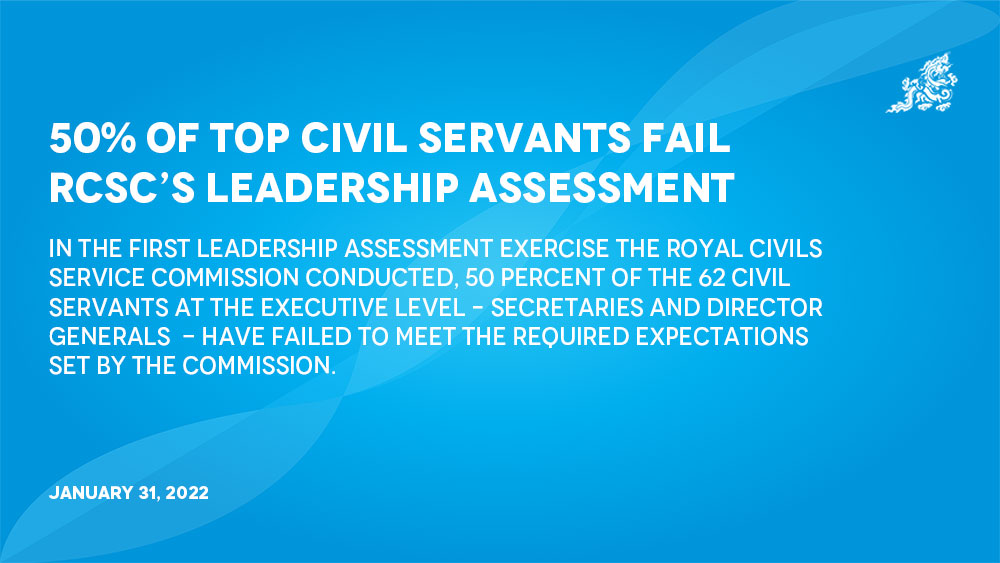Some could be moved out, demoted or offered retirement
Phurpa Lhamo
In the first Leadership Assessment Exercise the Royal Civils Service Commission conducted, 50 percent of the 62 civil servants at the executive level – secretaries and director generals – have failed to meet the required expectations set by the Commission.
Following the assessment, the RCSC is in the process of “managing them out,” or moving them out of their current positions.
RCSC officials said that RCSC wanted to better reward and recognise those who were able to perform. “Those who demonstrate that they are not able to perform will be moved out of their current positions to make way for those who are more capable. This could include managing them out to lower-level positions, and offering them the option of resignation or retirement.”
According to a press release the Commission issued yesterday evening, only 7 percent, which is around four individuals out of 62, had exceeded expectations. They will be assessed further for their suitability to assume expanded roles.
It is unknown who among the secretaries and director generals had performed well or had not met the expectations.
RCSC is currently in the process of reaching out to the secretaries and director generals individually to communicate the outcomes to them.
The Leadership Assessment Exercise, is an executive performance assessment conceptualsied as an instrument to enhance and clarify responsibilities and accountability. It was introduced in July last year.
Henceforth, regardless of the outcome of this assessment, RCSC would continue to monitor all executives’ performance closely, according to the press release. “Those who perform on the job will be rewarded and recognised. Underperforming officers will be managed out.”
Earlier, RCSC officials stated that the results of the assessment would guide the RCSC in its decisions on career and succession planning, and where required, providing alternative pathways to officials who are assessed as not being the best fit for their current positions.
RCSC has already started a similar process to assess directors in the civil service, which will be completed by March this year.
The assessment
Local and international assessors were part of the panel that assessed the executives this month.
According to the press release, the panel focused on assessing qualities that would be critical for addressing challenges Bhutan will face going forward. “The panel assessed the executives’ personnel management instincts, their ability to approach issues from a higher vantage point, collaborate with one another beyond their organisational boundaries, as well as their drive and ability to deliver results.”
The assessment was also based on the executive’s work plans; responses to realistic work-related scenarios; leadership feedback provided by their supervisors, peers and subordinates; and performance during group and individual interviews. The panel also assessed their ability to prepare themselves, their teams and organisations for the future.
The panel’s assessments have guided the Commission in making several critical decisions.
In the past, civil service at the executive level received proxy scores based upon the performance of their respective agency’s APA or APT.
In an earlier interview, RCSC officials said that if an agency was rated outstanding, the executives in that agency also got an outstanding rating for that year and vice versa. “A few P1 and executives who made significant contributions despite the low performance of the organisation can be demotivated. Similarly, those in the high-performing group due to others’ performance could demotivate those who work hard, as these ratings, amongst others, go on to decide future HR actions (promotions, transfers etc),” RCSC official said.
The Constitution’s Article 26, Section I states that the RCSC shall promote and ensure an independent and apolitical civil service that will discharge its public duties in an efficient, transparent, and accountable manner.
Importance of accountability among civil servants has been reiterated several times in the past.
The press release stated that the RCSC remained committed to ensuring that the Civil Service leadership had the necessary competencies and foresight to navigate the complex challenges that we are grappling with as a nation. “Bhutan needs leaders with competencies that can accelerate our development and secure a better future for our children.”
Further, it stated that the RCSC acknowledged that these assessments have reinforced the need to continuously review the civil service’s personnel management approach and processes, so that we can effectively differentiate the better performers from the underperformers.
Similar assessments for officers at the director-level will be rolled out this month, February. “The RCSC is reviewing and revamping its system and approach to shift the entire civil service to a more effective personnel management system to support Bhutan’s transformation,” the press release stated.
Following the press release that went viral on social media, some observers said that such exercise should extend to constitutional post holders and justices of the Supreme Court and High Court. “It is equally important to assess their performances and give room for improvement,” one observer said.
As per the Constitution, Justices and judges can be removed only through impeachment by the Parliament. However, a retired civil servant said that if they fail from the assessment like the ongoing assessment initiated by the RCSC, justices could be placed in different positions such as researchers. “There were some instances in the past where judges who could not perform were transferred in the research division on payroll,” he said.
Others said that it should be extended to public corporations as well.


